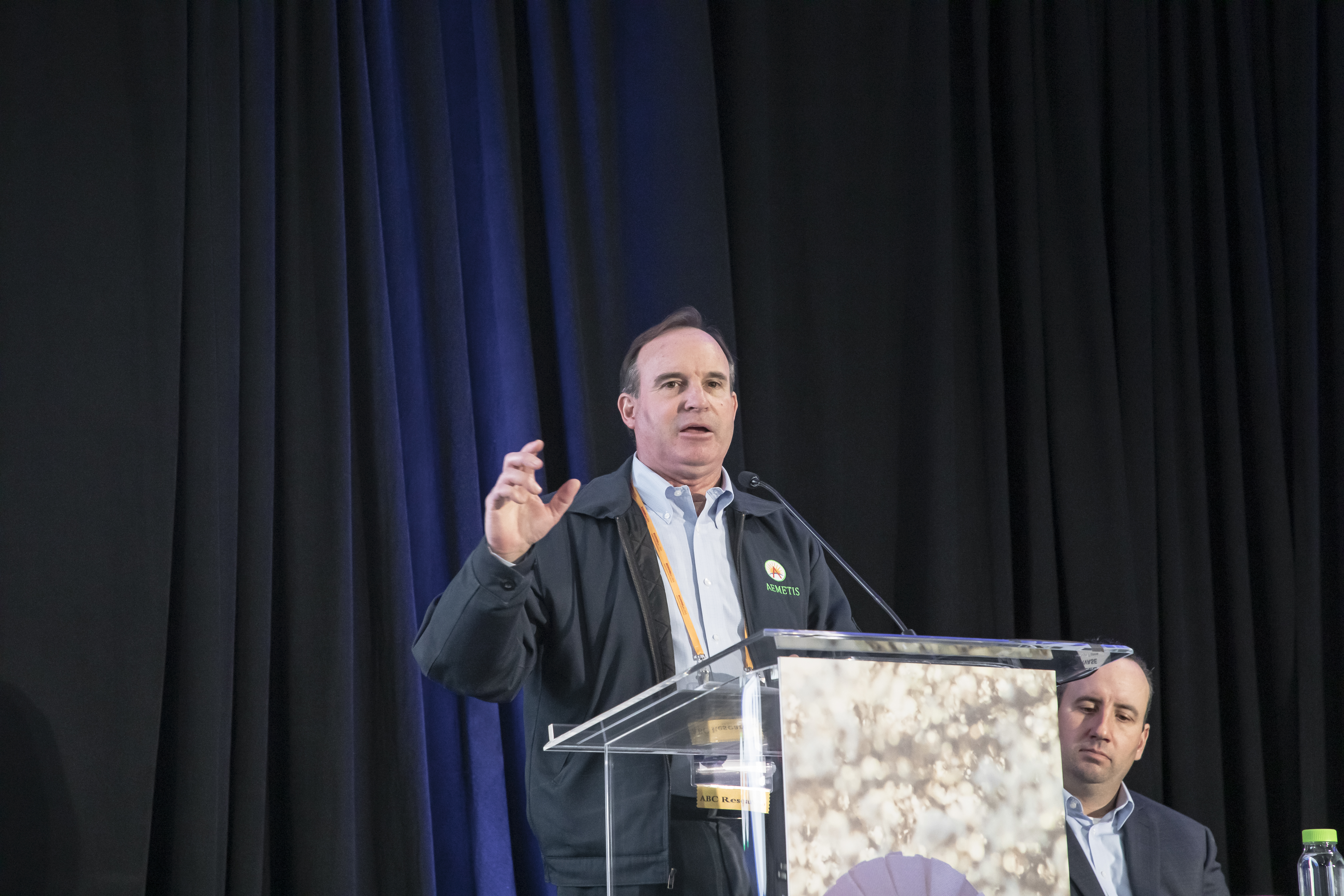(Feb. 14, 2020) – Finding higher value uses for almond coproducts and woody biomass (prunings and whole trees) in almond production is a top priority for the industry and Almond Board of California (ABC), and a key element of the Almond Orchard 2025 Goal focused on achieving zero waste in almond orchards. Among the multitude of benefits that come with finding alternate uses include a reduction in carbon emissions and environmental impacts, in addition to the potential to improve growers’ bottom line.
At The Almond Conference 2019 in Sacramento this past December, Aemetis and Corigin, two companies headquartered in California’s Central Valley, shared how they are working with the industry to develop innovative uses for woody almond biomass.
 Aemetis Chairman and CEO Eric McAfee spoke to attendees of The Almond Conference 2019 about the company’s work with the California almond industry to develop new uses for almond biomass
Aemetis Chairman and CEO Eric McAfee spoke to attendees of The Almond Conference 2019 about the company’s work with the California almond industry to develop new uses for almond biomass
Aemetis is a renewable fuel company that uses innovative technology to produce low-carbon products that are intended to replace petroleum. While Aemetis is known for producing ethanol and biodiesel, the company has recently changed its focus to find the most efficient use for orchard waste across California. Their answer is converting orchard wood waste into low-carbon ethanol.
“[Making] cellulosic ethanol from the waste of almond wood is the second-best way, only behind biomethane, to create carbon reduction in the state of California,” said Eric McAfee, chairman and CEO of Aemetis. “We have spent the last 10 years determining the best and most beneficial way to convert wood stock [into ethanol].”
According to Aemetis, California orchard waste could produce 160 million gallons of cellulosic ethanol per year, reducing carbon emissions and creating 30,000 direct and indirect jobs in California. Aemetis recently signed a lease to build a plant near Modesto, the first of four planned plants it hopes to build. Using federal loans, additional plants are planned for building in Mendota, Tracy and Delano to reach an output of 160 million gallons of ethanol annually.
Corigin, meanwhile, sees an opportunity to convert almond shells into value-added products: They claim they can process 2,000 pounds of shells into 1,600 pounds of high-value plant growth stimulants, biochar, bio oils and biogas.
“Our collective vision here is to help facilitate, generally, a bio-carbon economy,” said Michael Woelk, co-founder and CEO of Corigin. “If you think about the world and the best place to set up something like this, it would be California.”
Corigin, based in Merced, is slated to be operational in May 2020, Woelk said. The company has even developed a bio-pesticide called Coriphol, which is distilled from California almond shells for use in foliar and drip applications. While Corigin stated their field trials have shown promising results, including a reduced need for total fertilizer loads, the company is still in the developmental stage and not yet fully operational.
The Almond Board, guided by its Biomass Workgroup, will continue to research higher-value uses for almond biomass that will deliver both environmental and economic benefits all while helping the industry reach its 2025 goal of achieving zero waste in the orchard. Between ABC research and innovative companies like Aemetis and Corigin, California may have more tools in the future to turn orchard byproducts into value-added materials for the industry and possibly consumers.
“We are excited to see efforts to innovate in this field,” said Karen Lapsley, chief scientific officer at ABC. “And for it to be truly meaningful for growers, it will need to increase demand for these materials, and as a result, improve the economics for growers, hullers and shellers.”
For more information regarding The Almond Conference session featuring innovations in woody biomass, please contact ABC’s Karen Lapsley at klapsley@almondboard.com or check out the slides presented by Aemetis and Corigin at the conference.